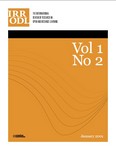Athabasca University: Conversion from Traditional Distance Education to Online Courses, Programs and Services
 In its 30 years of operation, Athabasca University has witnessed the full impact of the growth of online distance education. Its conversion from mixed media course production and telephone/mail tutoring to a variety of electronic information and communication technologies has been heterogeneous across disciplines and programs. More...
In its 30 years of operation, Athabasca University has witnessed the full impact of the growth of online distance education. Its conversion from mixed media course production and telephone/mail tutoring to a variety of electronic information and communication technologies has been heterogeneous across disciplines and programs. More...




/https%3A%2F%2Fprofilepics.canalblog.com%2Fprofilepics%2F1%2F0%2F1076071.jpg)